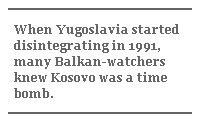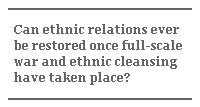Learning the Hard Way in Kosovo
Learning the Hard Way in Kosovo

ATHENS: The television images are haunting: children with bloated bellies and vacant eyes, flies swarming around their mouths. The statistics are staggering: 1.6 million refugees, 70,000 dead, thousands of women raped. The humanitarian crisis unfolding in Darfur, western Sudan, is a tragedy of Biblical proportions.
Surely, this is a case for intervention by the international community. And now, a new study on UN reform suggests that the world organization should enjoy even greater latitude to act - intervening when governments fail to protect their own citizens, as in the crisis in Darfur. Already there is talk of sanctions and maybe even the dispatch of a multinational peacekeeping force. But the issue is not whether to intervene, but how to do it better. The experience of the UN's other peacekeeping operations drives home a crucial point: The international community needs to act sooner and prepare better.

Since the end of the Cold War, there has been an explosion in international peacekeeping missions. From Bosnia to the Ivory Coast to East Timor, the pattern has been the same: a political rebellion (often with ethnic overtones), a brutal crackdown, a humanitarian tragedy - and a crisis that finally spurs the international community to action. Peacekeepers are sent in to enforce an often theoretical peace and build a nation from scratch. Peacekeeping has become synonymous with nation-building. And so far, none of these exercises have been particularly successful.
Kosovo is the most extensive of the 30-plus peacekeeping operations since 1988. Five years ago, the UN took control of the province, sweeping out a murderous Serb army and bringing in tens of thousands of international peacekeepers. Almost a million ethnic Albanian refugees have since returned, two general elections have been held, and thousands of destroyed buildings have been rebuilt. The UN has presided over every facet of Kosovar civil society, from determining municipal boundaries to enforcing air pollution standards.
But has this nation-building effort been a success? Not really. Old ethnic hatreds are ready to explode, as three days of violent riots showed last March. And since the UN arrived, hundreds of thousands of Serbs, complaining of threats, intimidation, and outright violence, have abandoned the province. Meanwhile, the unemployment rate ranges as high as 70 percent, and a third of the population lives in abject poverty.

The lessons of Kosovo and, more generally, the Western Balkans, are instructive. Of the three ethnic conflicts that followed the breakup of Yugoslavia - Bosnia, Kosovo, and Macedonia - only Macedonia was resolved fairly peaceably. The difference was that the European Union actively inserted itself into peace talks between the Macedonian government and the ethnic Albanian rebels, helping to broker a deal at Ohrid in 2001, before the nascent conflict had reached crisis proportions. (Likewise, the EU has been instrumental in brokering a slow dissolution of Serbia and Montenegro, which may yet lead to a formal, but peaceful separation of the two countries in 2006).
By contrast, the international community's record in Kosovo was marked by dangerous neglect. The warning signs were apparent: Since the end of World War II, the province has seen armed uprisings and repeated demonstrations against Serb rule. In the mid-1970s, Kosovo gained limited autonomy from Serbia only to be stripped of autonomy when Slobodan Milosevic unilaterally dissolved the provincial parliament in 1989. Thus, when Yugoslavia started disintegrating in 1991, many Balkan-watchers knew Kosovo was a time bomb.
But rather than act, the international community dallied. A quick history: In 1991, the Albanian representatives of the dissolved Kosovar parliament declared independence and sought recognition from the European Union. The EU refused. Four years later, during the Dayton Peace Accords negotiations to end the Bosnian war, the Kosovar Albanians begged to be included in the talks. Again, they were refused. Within months, the armed uprising in Kosovo began.

It was not until 1999 that the international community finally intervened by trying to broker a peace agreement on Kosovo in the French town of Rambouillet. Under the agreement, NATO troops were to occupy Kosovo, still legally a province of Serbia, and enjoy unrestricted movement throughout the country. If Serbia did not comply, NATO would begin bombing. NATO was refused, and the bombing campaign began. The Serbs retaliated by expelling 800,000 ethnic Albanians and multiplying the number of human rights violations.
"Rambouillet was more or less an ultimatum," says Thanos Veremis of the Hellenic Foundation for European and Foreign Policy, an Athens-based think tank. "It was a disaster, as I see it. The West could have worked out Rambouillet if they had just abstained from that last clause about occupying parts of Serbia."
The events in Kosovo raise many questions about the proceedings about Dafur. Will the unwanted presence of UN peacekeepers prompt even greater reprisals against the black African population? Is it already too late for diplomacy? Can ethnic relations ever be restored once full-scale war and ethnic cleansing have taken place?

If it's not too late for a true peace to be negotiated, then what? Most UN peacekeeping-cum-nation-building operations have consistently failed to address long-term economic development. Again, Kosovo is instructive. The province is one of the poorest regions in Europe (and Darfur is one of the poorest regions in Africa). It has the highest population growth rate in the Balkans, most farming is at subsistence levels, crime and corruption have flourished, and almost three-quarters of the workforce remain jobless. And the UN has learned the hard way that widespread poverty mixed with ethnic hatreds creates a volatile mix.
As Joseph Siegle at the University of Maryland points out, peacekeeping and economic development must go hand-in-hand. "There has to be more emphasis placed on economic development," says Siegle. "Because when people are busy working they have less time to be fighting."
Kosovo's transition from a socialist to a free-market economy complicates the picture. Though always difficult shift, the process has been particularly vexing in Kosovo. Because of Kosovo's twilight status - not quite an independent country but not quite a Serbian province - the ownership of public assets is unclear. Who owns the factories, mines, and public utilities that make up the backbone of Kosovo's industrial sector - Serbia, Kosovo, or the UN? And, by extension, who has the right to sell these assets? In the five years since the UN began operations in Kosovo, it has managed to privatize just 16 of over 400 state- and worker-owned enterprises. Without clear ownership of factories, mines, and land, it is very difficult to attract investors that will create much-needed jobs.
While other territories like Darfur may not be making the transition to free markets, the underlying question of legal ownership of resources will have to be considered. Indeed, it must be part and parcel of all future peace negotiations. In Sudan, for example, control of the region's oil revenues has been widely debated in the marathon peace talks between Khartoum and southern rebels.
Next year, the international community will begin to address the so-called final status issue for Kosovo: Will it become an independent country, be partitioned along ethnic lines, or remain an autonomous Serbian province? Each solution has its own perils. It may be too late to turn back the clock on Kosovo. But the lessons of peace keeping-cum-nation building in the Balkans are clear: Look before you leap.
Alkman Granitsas is a freelance journalist based in Athens, Greece. He is currently writing a book about the Balkans. He can be reached at: agranitsas@yahoo.com.